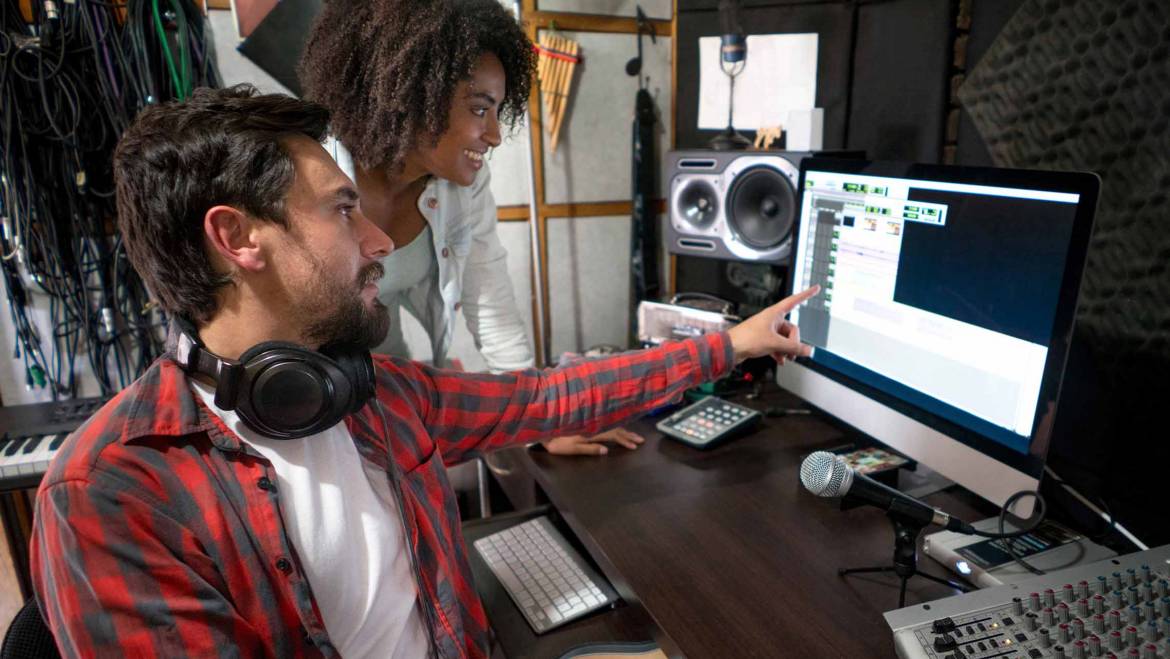Every great musician has their unique selling point – it might be an amazing voice, a gift for songwriting or some serious shred skills, but it’s likely that none of these assets will help you get that all important gig unless you can get your talents down on tape and make your recording sound professional.
In this article, I’m going to explain how different types of musicians can benefit from learning production skills. Read on to see how this applies to you.
Band demos and audition tapes
Whether you’re a jobbing musician making a showreel for an audition or a band putting together your first demo, you stand to benefit hugely from learning how to produce for yourself.
There’s never been so much competition out there, so it’s vital that you make a good first impression. If your recording sounds polished, it will give you a huge advantage over those that don’t. This applies to unsigned acts, function bands, cruise ship performers, musical theatre professionals and even students applying for certain types of music degrees.
Hiring someone else to engineer and produce can be expensive, so you should consider learning the fundamentals of production – and I don’t just mean knowing how to press record and knock out a take.
Film and TV composers
If you’re making a pitch for a potential new client, you need to know some basic mixing and editing tricks to impress them right out of the box. A score on its own isn’t going to suffice – you need to go that extra mile and provide a professional recording with full instrumentation. Even if you’ve already got your head around MIDI, a dull, lifeless-sounding mix will only serve to hold you back and may blow the opportunity of a lifetime.
The good news is that you can bring your score to life with virtual instruments. There are software emulations available covering almost every sound imaginable, from ethnic percussion to gospel choirs and synthesizers to symphony orchestras. Most developers offer a free trial, so why not download a few demos and see which products work best for you?
This is only the start – once you’ve found the right sounds, you need to get them to sit well in the mix. This can be tricky for the uninitiated, especially when dealing with some of the complex multi-layered presets that come in the high-end packages. At the very least, you will need to acquire some rudimentary knowledge of EQ and dynamics processing.
Session players
There was a time when all a session guy/girl needed to ply their trade was the ability to sight read and play an instrument well. For the most part, that age is over – today it is often expected that you will perform the role of engineer/producer as well as being the talent in front of the mic.
As studio time is expensive, don’t be surprised if you’re asked to record your own parts remotely. You’ll need to assemble a decent recording setup and know how to get the best sound from it. You may even be expected to ‘comp’ your own audio files (merging the best parts from each recorded take to create one seamless performance).
It’s all about practice, so once you’ve learnt how to achieve the sound that your clients are looking for, you’ll find it much easier to repeat the process. The last thing any client wants to do is spend hours fixing a bunch of poorly-produced takes. Stick at it and you will ultimately get more work.
“What do I need to know?”
Before you jump in and try your hand at self-producing for the first time, have you considered any of the following?
- Choosing the correct file format and quality to use in your project
- Setting the input level and leaving enough headroom
- Preventing and removing pops and clicks
- Improving the pitch and timing of your recorded performance
- Balancing the volume and pan of different instruments
- Applying EQ and compression
- Adding time-based effects such as reverb and delay
All of these variables are absolutely essential to the production process – and we’re only getting started.
If this sounds overwhelming, please don’t panic. All it takes is to put aside some time to learn a few new skills. The DAW Tutor can help steer you on the right path, so consider booking a lesson with us and we’ll provide you with the knowledge you need to succeed in this new era of recording.
The blurring lines of the industry
To round things off, I want to leave you with one valuable anecdote.
Last week, I attended a networking event organised by Media Match UK. I met a whole host of keen young musicians sporting name tags reading ‘Singer/Songwriter/Producer’, ‘DJ/Producer’, ‘Multi-instrumentalist/Producer’ and similar titles. A few years ago this would have surprised me, but not today. With the world of production shifting from studios to bedrooms, and budgets shrinking at a rapid rate, the skill set required to get ahead in the music industry is become wider all the time. It’s no wonder that more of us are choosing the multidisciplinary route.
Who can predict where the industry will be in 10 years’ time? One thing is for certain though – technology will be firmly at the centre and if you don’t know how to use it to your advantage, you will be left behind.

